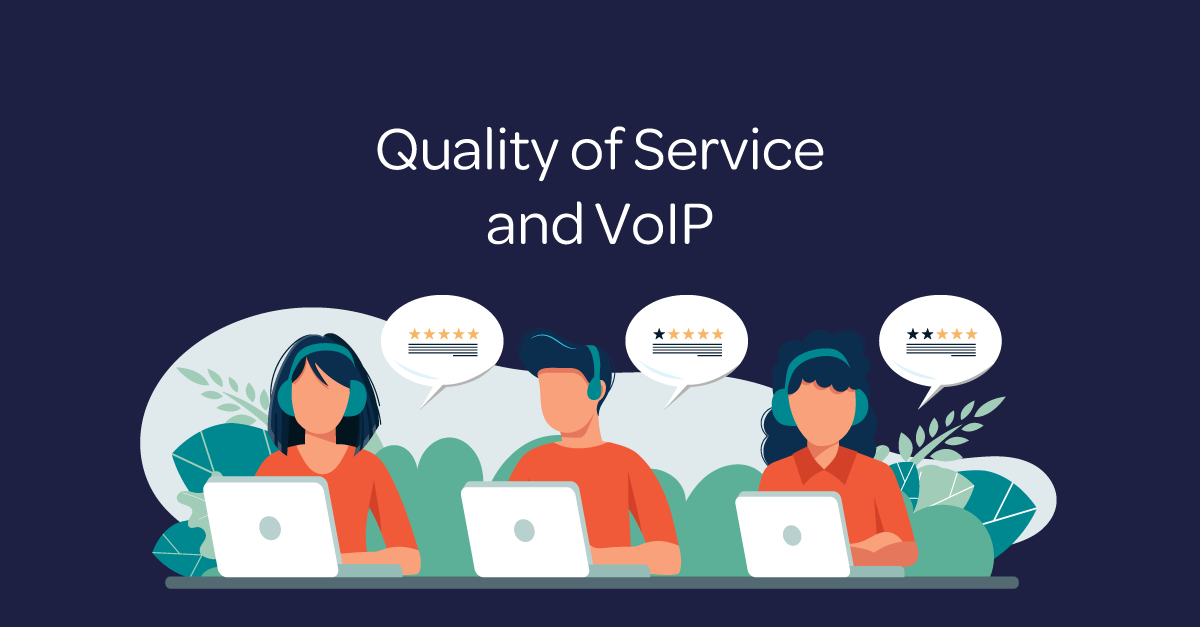Quality of Service (QoS) and Voice over Internet Protocol (VoIP) are very important for communication in today’s business environment.
Because of this, IT departments are under pressure to keep applications running – especially VoIP phone systems (which are internet-based phones).
Naturally, this can only be achieved through good bandwidth management and proper QoS.
If you didn’t already know, small and medium-sized businesses are now choosing VoIP phone systems as their number 1 tool for communicating with customers and clients. The main reasons for this are to:
- Improve day-to-day communication with customers
- Enable teams to collaborate together remotely and in the office
- Access a wide range of features, such as call recording and video conferencing
However, a VoIP system’s QoS determines how good it performs. The key is to invest in a VoIP package and couple it with smart QoS technology – otherwise, you will struggle to communicate with your people and customers.
Every business is different when it comes to their QoS needs – so there’s a lot to learn.
With that said, let’s dive into the relationship between QoS and VoIP. No matter what type of business owner you are, you won’t want to miss a detail.
So, what is QoS?
QoS is the technology that businesses use to manage their networks.
The purpose of QoS is to:
- Control network traffic
- Make sure that applications on the network perform well
- Prevent common problems (such as connection drops and lag) from happening
Primarily, QoS is concerned with:
- Bandwidth
- Latency
- Error rates
Take a moment to think about the modern technology and services you use on a daily basis. Here are some examples that might come to mind:
- Online video games
- Movie streaming platforms like Netflix
- Video calling apps like Facebook Messenger and Zoom
These types of services – which all involve large amounts of network traffic – are reliant on QoS. Without it, there would be chaos. To put it into perspective, communicating with your customers would be significantly more difficult.
Thankfully, through QoS, a network administrator can assign which business applications receive priority treatment when it comes to bandwidth.
For example, if a business has an application with large traffic flow, then this specific application can be assigned the network packets it requires. As a result, it will be able to perform without experiencing problems.
QoS and VoIP: What’s the Relationship?
VoIP is now the mainstream medium for telephone communications. Plus, the ISDN switch off is going to happen in 2025, which will lead to an even greater number of businesses using VoIP systems.
So, when it comes to VoIP phone systems, QoS is the glue that will keep everything together moving into the future.
QoS is used to control VoIP traffic in smart ways, which then helps to eliminate network issues such as audio quality and call delays.
Because of how popular VoIP systems have become with companies, they encounter a lot of traffic. Imagine a call centre building with 300 different phone agents who work 9 AM to 5 PM. Each hour, they’re going to be making tons of calls via VoIP. Unsurprisingly, this leads to a lot of traffic which – if you allow it to – can lead to major problems.
This is why QoS is so important, as it drastically helps to eliminate VoIP problems!
So, if you’re a business owner whose VoIP system is inconsistent, poor-quality, and causing your customers to have nightmares, then make sure to read the next section.
QoS: Why Does it Matter?
QoS matters a great deal.
If your business is communicating with people day in and day out, then it needs a reliable network connection: simple. This is good for your customers and it’s also good for your team.
However, if your calls are constantly getting dropped due to poor network coverage, it’s going to upset and frustrate your customers – and could even lead to them switching to a rival company!
Therefore, by using QoS in networking, you will gain the ability to optimize the performance levels of all your applications – with your VoIP system being at the top of the list.
Transmission delay will be at an all-time low as a result, enabling you to relax and have peace of mind knowing that your phone calls will be stable and your customers will be happy.
Additionally, QoS will also ensure that you can achieve your expected service quality. After all, customer expectations are sky-high in the modern era – meaning there’s no room for error.
If your business isn’t up to the task, you’ll get found out, and your brand image will suffer as a consequence!
The last thing you want is for a customer to speak to you over a poor-quality connection and then bad mouth your customer service online.
With QoS, though, you won’t ever have to worry about this happening.
What are the Limitations of QoS?
As with most technology, nothing is perfect.
QoS does come with a handful of limitations – and we’re going to let you know about them. Let’s take a quick look:
- QoS won’t impact your ISP’s (Internet Service Provider) existing issues, which can have a significant effect on VoIP.
What this means is that if your internet provider is poor, then QoS isn’t going to be able to do much to change that, as the core of the problem (your provider) is still there.
This is why (before anything else) you need to prioritise finding a good internet provider. After this, you will experience a much stronger connection when making VoIP calls.
- Blocked packets.
Packets of data flowing through your network might suddenly be blocked by appliances standing in the way, with firewalls being the main culprit.
When this happens, your QoS can’t do anything to change it. Therefore, you need to be aware of any existing internet applications you have that hold the potential to impact the QoS! Otherwise, you’re risking the occurrence of some really annoying problems.
However, you don’t need to worry, as all you’ll have to do is change the settings of your problem applications or replace them with fresh ones that won’t interrupt your QoS.
- QoS won’t affect audio compression/quality.
When you and your team are making and receiving phone calls, the audio quality is down to your provider and the equipment you use – not your QoS.
The QoS cannot improve the actual quality of the audio. Instead, it can improve the consistency and strength of calls so that there is less delay and distortion.
- You need to maintain QoS rules.
As we’ve discussed, QoS is essentially the management of your network and the rules within it. These rules will dictate how your VoIP phone system operates, which is why it’s essential that you maintain and update your rules when necessary. If they are set up incorrectly, then it could have a bad impact on your entire VoIP system.
- A network engineer might be required for help and maintenance.
In the world of business, not everyone is tech savvy. In fact, according to research, 75% of business owners want to increase their usage of digital tools, but a lack of qualified in-house staff is preventing them from doing this.
However, there’s no need to panic. If none of your team know how to maintain your network, you can get a network engineer to do everything for you. Although this will cost money, it’s a much better alternative to the potential chaos that would take place without one!
QoS VOIP Benchmarks
On the other hand, if you are a tech savvy individual, then follow along with these benchmarks so that you can understand where you may need to make improvements to your VoIP QoS.
Latency: 150ms maximum
First, latency.
A ping of 100ms or below is the general average for most broadband connections.
As a business, you should be aiming for between 50ms and 100ms for a good (and reliable) connection. If you have a ping of 150ms or greater, then that’s a problem (and is referred to as ‘high ping’).
When you have a team of employees speaking to customers on the phone, they’re going to struggle with the connection if your ping is over 150ms.
Aside from switching network providers, you can lower your ping by:
- Changing to ethernet cables
- Removing other devices from your business network
- Ensuring background apps on your employee devices are shutdown
Doing this will help get your ping within a healthy range.
Jitter: 30ms maximum
Secondly, jitter.
A delay of 30ms or greater will almost certainly result in disruption to your calls, packet loss, and poor audio quality. As a business, this is the last thing you want.
Therefore, you should be aiming to get it below 30ms for improved efficiency.
Packet loss: 3% maximum
Finally, your packet loss should not be more than 3%.
When you’re making audio and video calls over a VoIP phone system, a packet loss of above 3% is likely going to cause disruption.
Ideally, you should be looking for 1-3% packet loss maximum, as this is generally deemed an acceptable standard in the world of modern communication.
If you successfully abide by these recommendations, you’ll be able to operate over your VoIP system to a high standard.
Setting up your own QoS: Some Useful Tips
When setting up your own QoS, you should firstly prioritise network traffic by type instead of device. The reason for this is because it won’t allow a certain device type to use the majority of bandwidth, as VoIP is not limited to a specific device type.
Next, ensure that the ‘Differentiated Services Code Point (DSCP0) 46’ is marked as high priority.
Then, if applicable, you should set up Trust Mode, which will allow administrators to prioritise specific data packets when traffic is buffered due to congestion.
Conclusion
So, we’ve reached the end of the blog. Hopefully, you should be much more knowledgeable about QoS and VoIP than you were 5 minutes ago!
In the current age, how you communicate with customers will make or break your business. This is why you should be focused on a VoIP phone system and the QoS technology that you use. Once you tick these boxes, your brand quality and reputation will get a big boost. Plus, you won’t have to spend every hour worrying about whether your business calls will suddenly drop.
Moving forward, make sure to use this guide to improve your communication with customers and clients.
Our Knowledge Hub For SME Insights
Wayv Shortlisted in Chamber of Commerce Awards 2025
We're pleased to share that we've been shortlisted by the Barnsley & Rotherham Chamber of Commerce in their annual awards for the second year running!
Wayv Volunteering July 2025
On Friday 11th July, the Wayv team helped out at Norton Nurseries, a food growing site recently acquired by Food Works, a Sheffield-based social enterprise.
Guide: Connecting your new DSL Router
Instructions for connecting your new DSL router
Navigating the Big Switch Off for your business
If you’re one of the estimated 75% of small to medium businesses still relying on traditional phone lines, read on to find out how to navigate the switchover.
Why business phone systems are adding more value than ever
Phone systems now integrate with other business systems as standard, enabling a more streamlined approach to managing business communications.
Wayv Shortlisted in unLTD Business Awards 2024
Following on from our shortlisting in the Barnsley and Rotherham Chamber of Commerce’s Celebration of Business Awards, we’re…
Wayv Shortlisted in Chamber of Commerce Awards 2024
“We’re proud to be shortlisted in these awards alongside some fantastic local businesses. Our continued growth is testament…
Wayv Certified Carbon Neutral for Second Year
Wayv are delighted to have been certified carbon neutral by Carbon Neutral Britain for the second year running.














